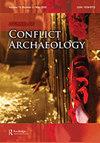Editorial
IF 0.6
0 ARCHAEOLOGY
引用次数: 0
Abstract
This issue of the Journal of Conflict Archaeology is slightly different to previous issues in having a single theme and only two papers. The theme of the issue is the Battle of Waterloo and the work being undertaken there by the organization Waterloo Uncovered. This organization is a charity established in 2015 by two Coldstream Guards officers, one former and one serving, Mark Evans and Charlie Foinette. They had an interest in Waterloo as soldiers, and particularly in Hougoumont Farm as Coldstream Guards given the regiment’s role during the battle; they also were aware of the potential of archaeological fieldwork for recovery and rehabilitation of service personnel after combat tours. Waterloo Uncovered is building on the success of groups such as the excellent Operation Nightingale, which has been running since 2011 through the Ministry of Defence and Wessex Archaeology; the value of the work for the veterans was recognized in January 2022 when the MoD archaeologist Richard Osgood was awarded an MBE for his work with Operation Nightingale. In the United States, American Veterans Archaeological Recovery (AVAR) is an offshoot of Operation Nightingale which involves experts of the calibre of Doug Scott, who is undoubtedly the most celebrated conflict archaeologist of us all. Waterloo Uncovered, like the other organizations, has a central mission to include service personnel (both serving and former), who have been marked by their combat experience. Archaeology has been shown to help both physical and mental rehabilitation for veterans, which is reason enough for these organizations to exist. However, the fact is that they all have excellent records in producing first class archaeological results. These organizations are collaborations between service personnel and archaeologists, and the humanitarian mission in no way has compromised the quality of the archaeology being undertaken. Nor is this activity the result of Archaeology saviours swooping in to rescue the poor service personnel; Operation Nightingale relies heavily on two veterans’ organizations, Breaking Ground Heritage and Defence Archaeology Group (DAG), who also run archaeological projects but provide a lot of the volunteers for Operation Nightingale. Veterans are fully involved in the projects at all levels and contribute hugely to the success of these organizations. Waterloo Uncovered is the initiative of veterans and it remains a veteran-focused operation. The Waterloo Uncovered project has provided the first opportunity to undertake substantial archaeological investigation of the battlefield and its environs. It is reliant on grant funding and public donations, but that has so far meant that the project has been undertaken on a large scale, using cutting edge technology, and expanding the scope of what an archaeological project might include. Along with veterans, professional archaeologists, and students, the project has brought in professional photographers, artists, and poets to give their take on the battlefield and the project. It has been very collaborative, with the University of Glasgow’s Centre for Battlefield Archaeology (now JOURNAL OF CONFLICT ARCHAEOLOGY 2021, VOL. 16, NO. 2, 65–68 https://doi.org/10.1080/15740773.2021.2052010社论
本期《冲突考古杂志》与前几期略有不同,只有一个主题,只有两篇论文。本期的主题是滑铁卢战役以及“滑铁卢揭秘”组织在那里开展的工作。该组织是一家慈善机构,由两名冷流卫队军官Mark Evans和Charlie Foinette于2015年成立,一名前任,一名现任。作为士兵,他们对滑铁卢很感兴趣,尤其是考虑到该团在战斗中的角色,作为冷流卫队,他们对Hougoumont农场很感兴趣;他们还意识到考古实地调查对服役人员在作战之旅后的恢复和康复的潜力。“滑铁卢大揭秘”是在优秀的“南丁格尔行动”等组织的成功基础上展开的,该行动自2011年以来一直通过国防部和威塞克斯考古部开展;2022年1月,国防部考古学家理查德·奥斯古德因其在南丁格尔行动中的工作而被授予MBE勋章,这项工作对退伍军人的价值得到了认可。在美国,美国退伍军人考古恢复(AVAR)是南丁格尔行动的一个分支,该行动涉及道格·斯科特这样的专家,他无疑是我们所有人中最著名的冲突考古学家。与其他组织一样,“滑铁卢揭秘”组织的核心任务是包括服役人员(包括现役和退役人员),他们以作战经验为标志。考古已被证明有助于退伍军人的身心康复,这就是这些组织存在的充分理由。然而,事实是,他们都在产生一流考古成果方面有着出色的记录。这些组织是服务人员和考古学家之间的合作,人道主义任务丝毫没有影响正在进行的考古工作的质量。这项活动也不是考古救星突袭救援贫困服务人员的结果;南丁格尔行动在很大程度上依赖于两个退伍军人组织,即破土动工遗产组织和国防考古小组,他们也负责考古项目,但为南丁格尔活动提供了大量志愿者。退伍军人充分参与各级项目,为这些组织的成功做出了巨大贡献。“滑铁卢揭秘”是退伍军人的倡议,它仍然是一项以退伍军人为重点的行动。滑铁卢大揭秘项目为对战场及其周边地区进行大规模考古调查提供了第一次机会。它依赖于赠款和公众捐款,但到目前为止,这意味着该项目已经大规模开展,使用了尖端技术,并扩大了考古项目的范围。除了退伍军人、专业考古学家和学生,该项目还邀请了专业摄影师、艺术家和诗人来展示他们对战场和项目的看法。它与格拉斯哥大学战场考古中心(现为《冲突考古杂志2021》,第16卷,第2期,65-68页)进行了非常合作https://doi.org/10.1080/15740773.2021.2052010
本文章由计算机程序翻译,如有差异,请以英文原文为准。
求助全文
约1分钟内获得全文
求助全文
来源期刊

Journal of Conflict Archaeology
ARCHAEOLOGY-
CiteScore
0.80
自引率
50.00%
发文量
8
期刊介绍:
The Journal of Conflict Archaeology is an English-language journal devoted to the battlefield and military archaeology and other spheres of conflict archaeology, covering all periods with a worldwide scope. Additional spheres of interest will include the archaeology of industrial and popular protest; contested landscapes and monuments; nationalism and colonialism; class conflict; the origins of conflict; forensic applications in war-zones; and human rights cases. Themed issues will carry papers on current research; subject and period overviews; fieldwork and excavation reports-interim and final reports; artifact studies; scientific applications; technique evaluations; conference summaries; and book reviews.
 求助内容:
求助内容: 应助结果提醒方式:
应助结果提醒方式:


